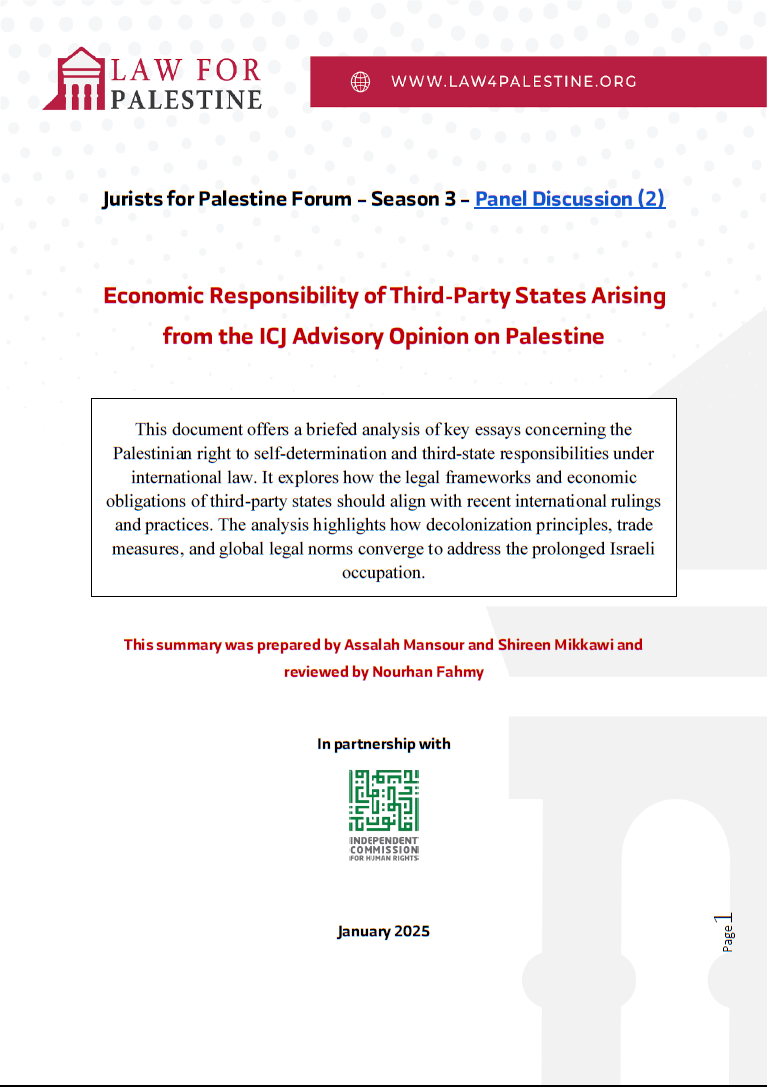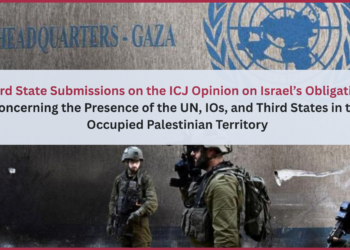Preparatory material | Economic Responsibility of Third-Party States Arising from the ICJ Advisory Opinion on Palestine
Jurists for Palestine Forum – Season 3 – Panel Discussion (2)
This summary was prepared by Assalah Mansour and Shireen Mikkawi and reviewed by Nourhan Fahmy
This document offers a briefed analysis of key essays concerning the Palestinian right to self-determination and third-state responsibilities under international law. It explores how the legal frameworks and economic obligations of third-party states should align with recent international rulings and practices. The analysis highlights how decolonization principles, trade measures, and global legal norms converge to address the prolonged Israeli occupation.
Summary:
- The International Court of Justice (ICJ) Advisory Opinion entails obligations on third states to implement trade measures that are essential for addressing Israel’s serious breaches of peremptory norms of international law, particularly the Palestinians’ right to self-determination.
- According to the Articles on Responsibility of States for Internationally Wrongful Acts (ARSIWA), States are obligated to collaborate to end serious breaches of international law through lawful means, and are prohibited from aiding in maintaining illegal situations created by serious breaches.
- Third States’ trade relations with Israel fall under World Trade Organization (WTO) rules, which take into account security exceptions under Article XXI of the General Agreement on Tariffs and Trade (GATT). These exceptions serve as legal bases for trade measures against Israel.
- Trade measures aim to make Israel’s illegal occupation economically unsustainable and are to be distinguished from unilateral coercive actions condemned by the global community.
- The Palestinian struggle for self-determination must be understood through the lens of decolonization, rather than statehood alone. The ICJ’s Advisory Opinion marks a significant shift in framing the issue as one of colonization and alien domination rather than a mere territorial dispute.
- The responsibilities of third states in addressing Israel’s occupation must go beyond merely boycotting settlement products to extend to the broader objective of making colonization economically unsustainable while emphasizing the right of return.
- UN General Assembly resolutions from the decolonization era could be applied as a guiding framework in the Israel-Palestine context to draw the connection between the principle of self-determination of colonized people and sustaining economic ties with the occupying power.
- Businesses operating in Israel and Palestine have a responsibility to respect human rights where the risk is heightened so greater due diligence is required. The private sector must align operations with international human rights standards and the UN Guiding Principles on Business and Human Rights (UNGPs). This corporate responsibility is also affirmed by the ICJ’s ruling and the ICC arrest warrants which considers Israel’s policies in the OPT as war crimes and serious violations of international human rights law.
Read the full preparatory material through this link. Click





